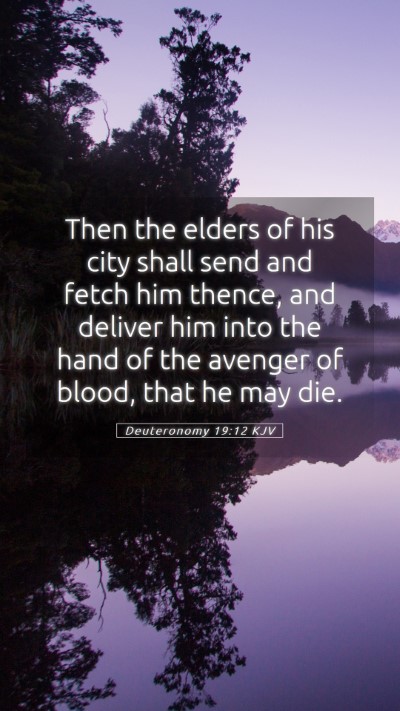Understanding Deuteronomy 19:12
The verse Deuteronomy 19:12 plays an essential role in biblical law, focusing on the judicial process and the significance of justice within the community. Below is a detailed analysis combining insights from several public domain commentaries, including those by Matthew Henry, Albert Barnes, and Adam Clarke.
Bible Verse Meaning
This verse states: "Then the elders of his city shall send and fetch him thence, and deliver him into the hand of the avenger of blood, that he may die." It outlines the procedure for dealing with a person who has committed murder, emphasizing the community's response to crime.
Bible Verse Interpretations
- Matthew Henry's Commentary: Henry emphasizes that this law illustrates God's view of justice and the gravity of taking a life. The role of the elders highlights the responsibility of community leaders to uphold law and order, reflecting God's character of righteousness.
- Albert Barnes' Commentary: Barnes offers insight into the cultural practices surrounding blood vengeance at that time. According to him, the verse underscores the seriousness of the crime of murder and incorporates the need for clear legal recourse for avenging such acts.
- Adam Clarke's Commentary: Clarke delves into the implications of the term "avenger of blood," explaining that this was a designated family member responsible for enacting justice. He emphasizes the societal norms concerning familial responsibilities and accountability in ancient Israel.
Bible Verse Understanding
The historical context of this verse should be noted, as ancient Israel had specific protocols to handle capital offenses. This system was not only about punishment but also about maintaining communal harmony and protecting the rights of the innocent.
Bible Verse Explanations
In exploring the applications of this law, we see the implications for modern understanding of justice and accountability:
- Justice System: The verse reflects the foundation of justice systems, where community involvement is pivotal.
- Restorative Justice: It hints at the importance of restoring order and making amends within a community.
- Accountability: The responsibility laid upon the elders and family members carries a profound weight on moral clarity and communal responsibility.
Scripture Analysis
This verse is part of a larger narrative on justice, found throughout the Torah, which sets standards for the treatment of individuals and preservation of community integrity. It is crucial to approach this verse with an understanding of its integration into the wider context of biblical law.
Biblical Exegesis
Through further examination, we discover that Deuteronomy 19:12 is interconnected with themes such as:
- Moral Law: Establishing ethical standards for human behavior.
- Social Responsibility: Highlighting the need for communal action in upholding the law.
- Protection of the Innocent: Ensuring that not only are the rights of the victims preserved but also those wrongfully accused.
Additional Bible Cross References
- Numbers 35:19: This verse elaborates on the role of the avenger of blood.
- Exodus 21:12: Discusses the punishment for murder in the context of God's law.
- Deuteronomy 19:1-3: Offers insight into the establishment of cities of refuge, further emphasizing justice and mercy.
Bible Study Insights
When studying this verse, one can explore how these ancient principles apply today. Many Bible study groups and online Bible study resources dedicate time to discussing such laws, enhancing understanding of scriptural principles in response to crime and justice.
Conclusion
Overall, Deuteronomy 19:12 serves as a vital reminder of the importance of justice within communities. It invites us to reflect on our roles in advocating for righteousness and understanding the deep-rooted systems of accountability laid out in Scripture. For those seeking to deepen their Bible study lessons, tools, and resources, reflecting on such verses enriches one's understanding of biblical principles and their applications in contemporary society.


